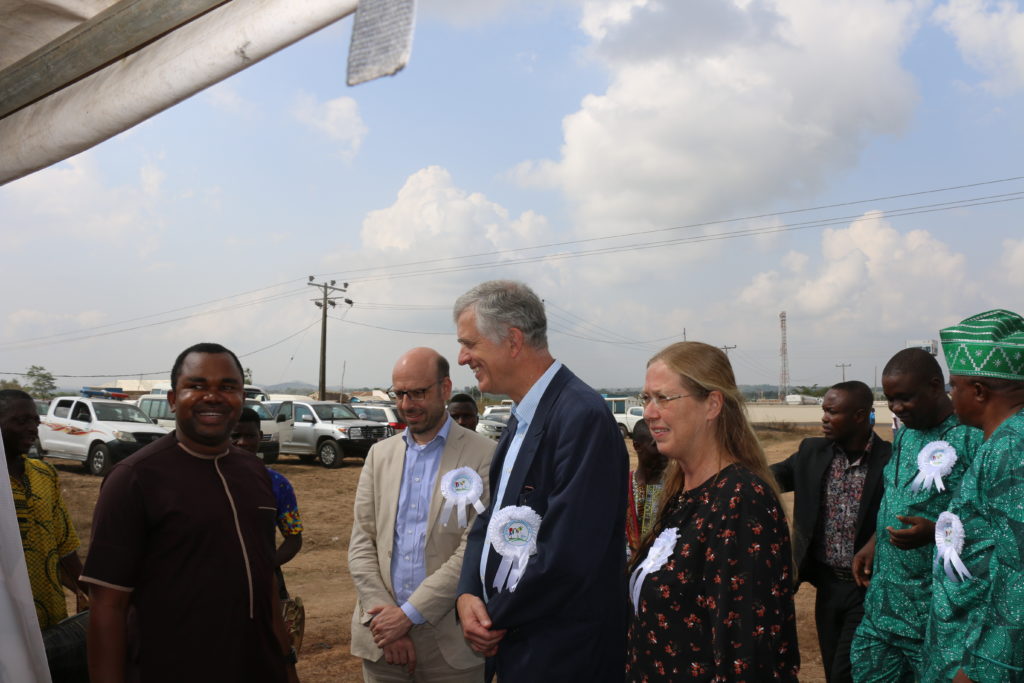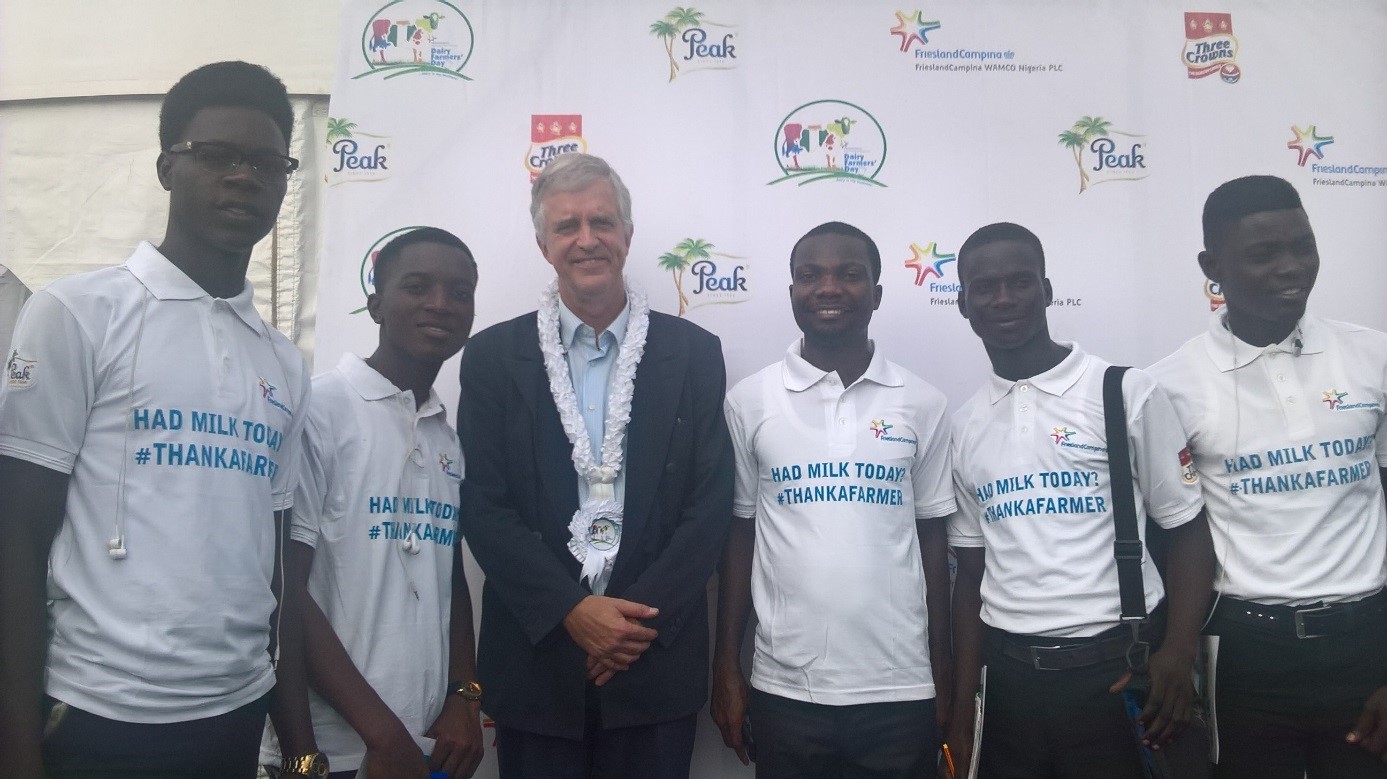
FrieslandCampina WAMCO (FCW), known as the largest investor in Nigeria’s dairy sector, organized the first Dairy Farmers’ Day in Iseyin, Oyo State, Nigeria, on December 7, 2017. The event highlighted the progress and challenges of the Dairy Development Program (DDP), a public-private partnership focused on cutting Nigeria’s huge import bill for dairy products and creating revenues and sustainable jobs within the industry. Stakeholders and officials attending the event included the Governor of Kebbi Sate, Atiku Bagudu; the Dutch Ambassador in Nigeria, Mr. Robert Petri; and FCW management staff, dairy farmers, financial institutions, community livestock workers acting as extension agents and business coaches, milk transporters, and representatives of feed supply companies.
The DDP began in 2010, and the Toward Sustainable Clusters in Agribusiness through Learning in Entrepreneurship (2SCALE) program joined the partnership in 2012. The DDP supports local sourcing of raw milk through engaging and organizing dairy clusters of Fulani milk producers and potential smallholder dairy farmers and by providing training, modern technologies, and coaching to enhance farmers’ business capacity. DDP is implemented by FrieslandCampina and 2SCALE, in close collaboration with the Nigerian Government and the Dairy for Growth program.
The DDP reflects FCW’s corporate responsibility in supporting rural households to become economically independent and in providing Nigerian consumers with affordable and good quality dairy products that have high nutritional value. Over the past three years, 2SCALE and partners have enrolled and trained more than 2,220 Fulanis, including 1,262 women, to supply high-quality milk to FCW through five modern milk collection centers (MCCs) built by FCW in and near Iseyin.
In support of DDP activities, 2SCALE also brokered linkages and developed a large network with public institutions, such as the Nigerian Institute for Trypanosomiasis Research (NITR), Nigerian universities, and private enterprises involved in milk cooling systems (Mueller), fodder (Advanta, Barenbrug), animal feed (Festola Feeds, Terratiga/Koudijs), hygienic equipment (CID Lines), and animal health (CEVA Santé Animale).
“Working with Fulani pastoralists and changing their attitude and mindset are possible if one can train and inspire them,” said Adekunyi Olayiwola John, DDP manager. “It goes beyond technology transfer. 2SCALE was instrumental in training and sensitizing the Fulanis to get the right milk quality, mobilizing them, and shifting them from pastoralism to dairy as a pure business.”
Moreover, beyond formal trainings, demonstrations, farmer-to-farmer training videos, and on-the-job coaching (e.g., feeding regimes for milking cows, milk hygiene at the herd level, proper use of antibiotics), the capacity-building program designed and implemented by 2SCALE also focused on business topics, such as the cost of production, milk collection network, e-payment system, and development of business relationships with other value chain actors.
A specific milk quality improvement program was set up and combined with a quality control system from herd to factory. 2SCALE identified and trained a pool of community livestock workers to serve as community-based extension agents and coaches. Fulani transporters who transport milk from herd-level to MCCs were trained in topics such as a milk delivery schedule, how to clean milk cans, and how to detect milk adulteration at the farm level.
Mohammed Zailani, the partnership facilitator for 2SCALE, said
“Fulani women and youth are known to play crucial roles, especially in local processing, pre-bulking, and ensuring quality milk supply to FCW. In addition to the semi-settled pastoralist Fulanis, sedentary farmers interested in investing in small-scale dairy farms, were also supported in pasture development, feeding, and artificial insemination.”
This assistance was progressively taken over by another program led by FCW focusing specifically on non-pastoralist dairy farmers.
To address specific gender-based gaps and constraints facing female actors in the diary business, 2SCALE built the capacity of women to work as groups and strengthened their knowledge and skills on financial literacy, milk hygiene, and cooperative management. Women and youth groups and an apex cooperative have been formed and are in the process of becoming registered by relevant Nigerian authorities. However, Zailani explains that despite the program’s achievements, better integration of more women and youth in the chain and stronger business relationships with other actors, such as transporters and credit services, are needed.

Milk is a source of healthy nutrients, including calcium, magnesium, zinc, phosphorus, iodine, iron, and potassium. Others are folates, vitamin A, vitamin D, riboflavin, vitamin B12, protein, and healthy fat.
“FCW Nigeria, manufacturers of dairy brands such as Peak Milk, Three Crowns, and Friso, prides itself with regarding its contribution to food security through the provision of quality dairy nutrition to Nigerians as well as through providing jobs for rural communities,” said Mr. Ben Langat, FCW Managing Director in Nigeria.
At the event, Ambassador Petri visited the 2SCALE information booth and was updated on project activities by Mr. Thompson Ogunsanmi, the Country Coordinator for 2CALE in Nigeria.
“2SCALE is professional in their approach, and this is highly impressive,” said the Ambassador.
In his closing remarks, he commented that
“the specific added value in this program is knowledge transfer and business skill development. That is very important. The Netherlands is a dairy country, and dairy farming is very important for economic growth. A country with so much potential like Nigeria for agricultural production is tremendous. We have a lot to offer and Nigeria also has a lot to offer as well. It’s a win-win partnership, and I’m very positive about the future, especially regarding employment opportunities for the youth. Young people should knock at the door and get involved. If you are persistent, you can have a good income for you and for your family. There are fertile lands and big markets here in Nigeria. I’m very positive about the future.”




